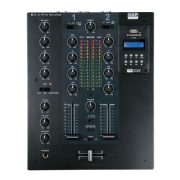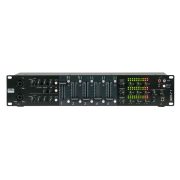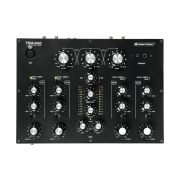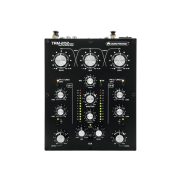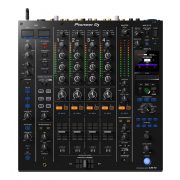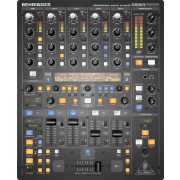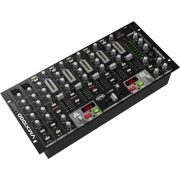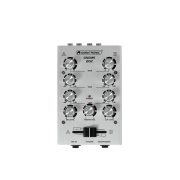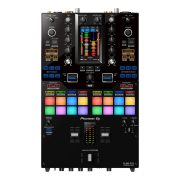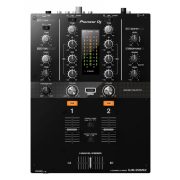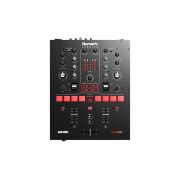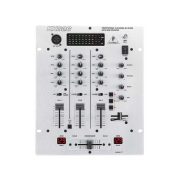Omnitronic TRM-222 Rotary Mixer
Like its predecessors, the TRM-222 is equipped with a 3-band master frequency isolator, which uses classic ALPS rotary potentiometers (Blue Velvet RK27) for precise sound control. The kill characteristic allows bass, midrange and treble to be completely canceled out, giving DJs creative freedom in shaping their sound.
The switchable filter section with HPF, BPF, LPF, resonance and sweep controls allows creative processing of the frequency bands. Two stereo input channels with gain control, clip LED, 3-band EQ and phono/line switching as well as a microphone input channel with gain control, 2-band EQ and on-air switch extend the mixer's range of applications. The LED level display for the master signal (L+R) and cue signal provide a good overview.
During the further development of the mixer, great importance was attached to feedback from the community. New functions such as the VU meter display per channel, dipswitches for individual adjustment of the EQ curve and a booth output (XLR or RCA) with 2-band EQ and volume control testify to the sophisticated functionality of the TRM-222. At the request of the fans, the mixer now has a crossfader in VCA technology with adjustable crossfade characteristics, an adjustable send-return effect path and an adjustable record-out.
In addition, the TRM-222 offers two direct outputs for timecode applications and a variety of outputs: Master and Booth (XLR/ RCA L/R), Record (RCA L/R), Master Insert Send/Return (RCA L/R) and FX In/Out (stereo jack).
- Filter section with resonance and sweep control for creative sound shaping
- 3-band master frequency isolator with vintage ALPS potentiometers (Blue Velvet RK27)
- Kill cut feature allows DJs to completely remove low, mid and high frequencies for amazing mixing
- 2 stereo input channels with gain control, clip LED, 3-way equalizer, FX Send and phono/line switching
- 2 microphone input channels with gain control, 2-way equalizer on air switch
- 2 effects send/return paths
- Dual analog VU meter
- Direct outputs for Timecode applications
- High-grade components ensure long life and excellent sound quality
- Booth output with separate 2-way equalizer and level control
- Record output, independent of the master
- Fully assignable VCA crossfader with adjustable curve
- Outputs: master and booth (XLR/RCA L/R), record (RCA L/R), master insert send/return (RCA L/R), FX in/out (stereo jack)
- Desktop console housing
- DJ filter LPF, HPF routable
- For application areas such as: Clubs/dancing school; mobile use; mobile djs / entertainer; homerecording and studios
What Makes a Rotary Mixer Special?
A rotary mixer stands out because it uses rotary knobs instead of traditional faders to control volume. This design choice brings several advantages and unique characteristics, making rotary mixers particularly popular among certain DJs and music genres.
Why Is It Special?
-
Smooth and Precise Mixing
- Rotary knobs allow for smoother and more natural transitions, especially during long blends.
- The gradual increase or decrease in volume feels more organic compared to standard faders.
-
Warm, Analog Sound
- Most rotary mixers use high-quality analog circuits and premium components, resulting in a richer, warmer sound.
- This makes them a favorite among classic house, techno, and disco DJs.
-
Better Dynamics and Musical Flow
- The rotary controls enable a more continuous and intuitive mixing process, perfect for deep, atmospheric sets.
- Ideal for genres like deep house, techno, and disco, where seamless transitions are essential.
-
Durable and Long-Lasting Design
- Rotary mixers are often built with premium materials and have fewer moving parts, making them more robust.
- High-quality rotary pots, like the ALPS Blue Velvet, are known for their longevity.
-
Exclusive and Unique DJ Experience
- Rotary mixers are less common and often more expensive, making them a prestige choice.
- The DJing experience is more tactile and immersive, encouraging a different approach to mixing.
Who Should Use a Rotary Mixer?
- DJs who prefer smooth, long blends.
- Those who appreciate warm, analog sound quality.
- DJs playing house, techno, disco, or ambient music.
- Those who value high-end, durable equipment.
Who Might Not Benefit from It?
- DJs who focus on fast cuts, scratching, or battle-style mixing.
- Those who rely on digital DJ controllers and automation.
- DJs who prefer quick transitions rather than gradual blends.
Conclusion
Rotary mixers represent a refined, premium approach to DJing. If you love organic mixing, warm sound, and smooth volume transitions, a rotary mixer could be a fantastic choice.
Are you thinking about getting a rotary mixer, or have you used one before?



























































